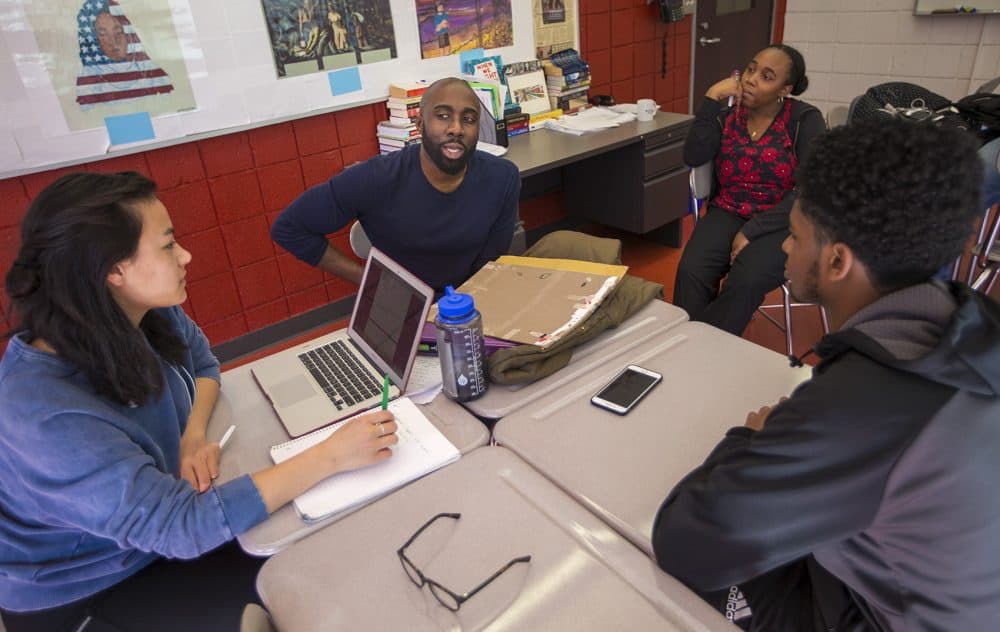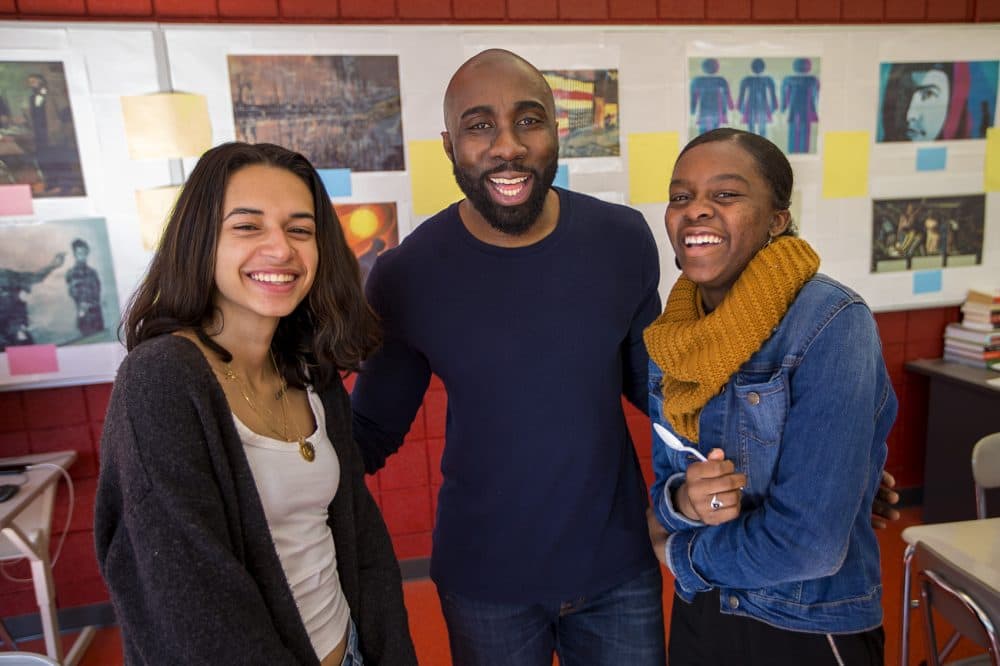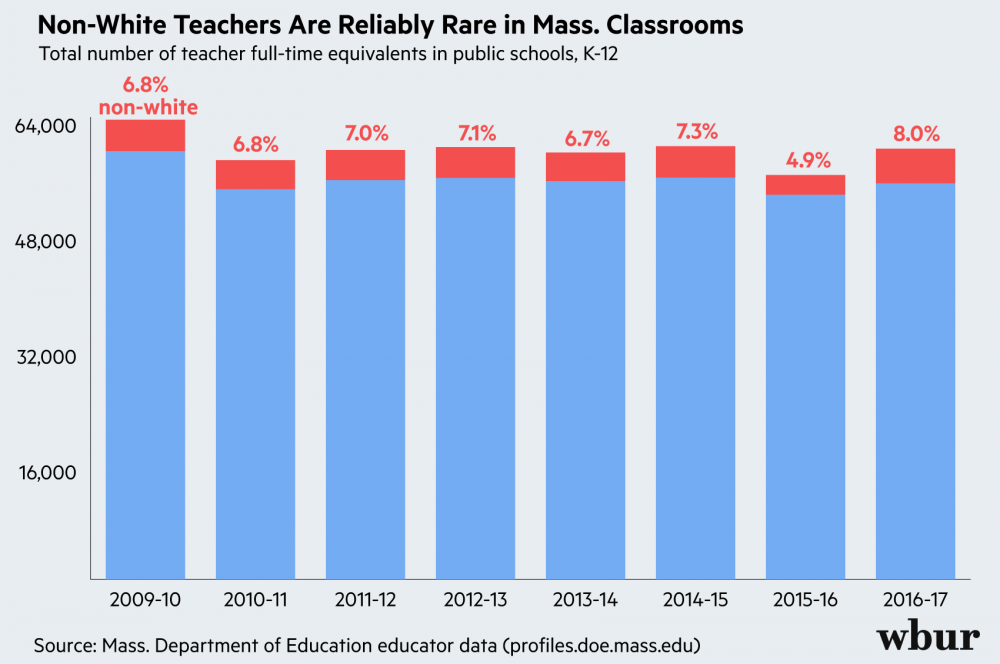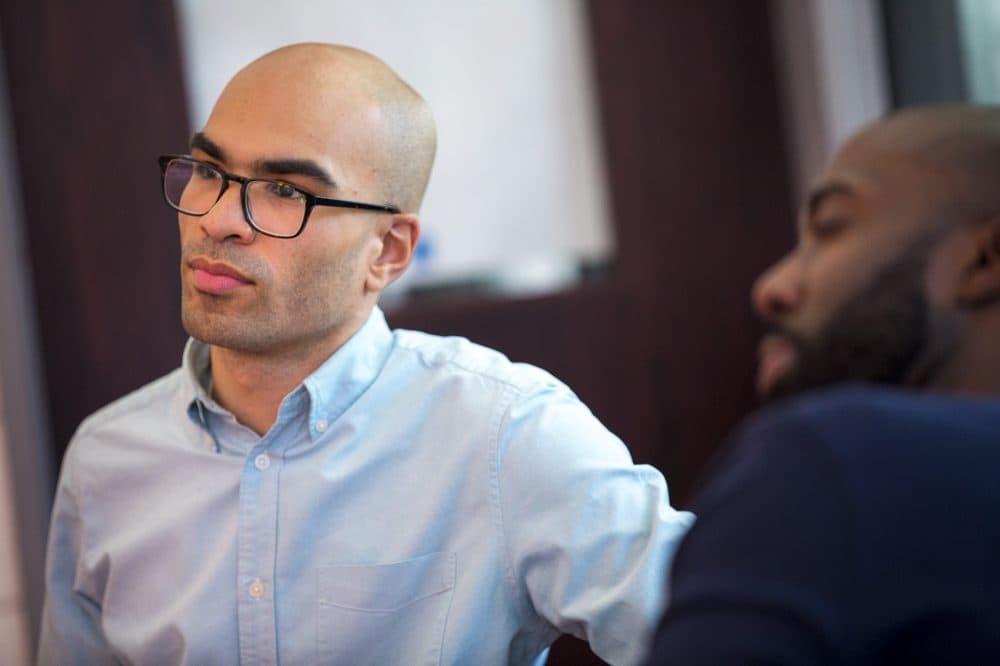Advertisement
Teaching Force In Mass. Public Schools Still Overwhelmingly White

When you bring up teacher diversity at Cambridge Rindge and Latin High School, the students will be the first to tell you things could be better. Senior Lorra Marseille says she can only think of two teachers of color off the top of her head.
"I’ve had Mr. Dua," said Marseille. "And then this semester I had Ms. Campbell."
Schoolwide, the actual number is closer to 40 out of roughly 150.
I met Marseille after school one day. She was one of about 20 kids hanging out in history and psychology teacher Kevin Dua’s room.
Marseille told me typically, there’s closer to 30 kids here, all of them students of color. She describes the area as a "safe space." And when I asked her what makes Dua's classroom different, Marseille didn't have to stop and think.
"We have a black teacher," she explained. "It makes it a little easier. I can walk in here and be like, this frustrated me today because someone said something racist ... I feel comfortable because I know that to some extent he can relate to a lot of my problems."
Dua believes it's not just his race that helps him connect with these students. But he said it is a significant factor and can help him empathize.
"At the end of the day I think my presence in this classroom alone has, in some ways, helped them feel like who they are as individuals can be empowered and validated," he said.

This is Dua’s first year here at Rindge and Latin. He explained these after-school gatherings happened organically. For administrators, this scene demonstrates the thirst many of their students have to be around teachers who look like them.
This year about 60 percent of students at Cambridge Public Schools identify as people of color. That's compared to just 22 percent of the teaching staff, a number district officials are hoping to improve.
"It becomes a question of equity and what are we willing to do," said Ramon De Jesus, the program manager for diversity development at Cambridge Public Schools. "What lengths are we willing to go to to make equity happen in our district."
De Jesus's position is new in the district. Part of his job is to help schools like Rindge and Latin reach their goal of increasing the number of teachers of color on staff to 30 percent by 2020.
Advertisement
But the challenge of recruitment and retention of teachers of color is not just an issue that Cambridge is wrestling with — it’s a statewide issue. In Massachusetts, minorities made up about 35 percent of public school student enrollment in 2017. For teaching staff, that number was about 8 percent, a figure that has barely moved since 2009.

"I’ve been at this for a very, very long time, and have felt the discomfort and sometimes frustration of not seeing much progress," said Regina Caines, the executive director of the Massachusetts Partnership for Diversity in Education.
Her group works with districts around the Boston area hoping to solve this issue. She said there are several factors at play, at least on the recruitment end of things, like teacher salaries and public perception of the career. But some of it boils down to basic competition.
"There’s competition for persons of color in almost any area that you can think of," said Caines.
The field of teaching itself is facing competition, too, as Caines points out that there has been a greater emphasis on steering students toward STEM careers.
Once students are interested in teaching, getting through training becomes the next hurdle. But it’s here that Caines has seen the most work and a number of innovations. She said more organizations are working together to help teacher candidates make it through the so-called pipeline.
Catherine Wong oversees urban outreach initiatives at the Lynch School of Education at Boston College. She says the college’s partnerships with local schools, and now nonprofits like City Year, help streamline the process for young teachers.
"The idea is to give them as much support to not only be recruited into teaching but to stay for the long haul," Wong added.
And that’s the hardest part.
"At the same time that teachers of color are coming into the profession, we’re also seeing this revolving door," said Travis Bristol, an assistant professor at Boston University's School of Education. In 2012 he studied black male teacher retention in the Boston Public Schools system.
He said working conditions were most often blamed by outgoing teachers, adding teachers of color are disproportionately more likely to teach in under-resourced schools where turnover in general is high. Bristol explained sometimes that's by choice, but he hypothesized that biases in the hiring process could also be at play.
Fixing this part of the pipeline is a lot more complicated. For Bristol, it’s less about whether school districts are capable of taking steps to retain teachers of color and more about their willingness to take on the challenge.
"I think they haven’t thought about it or given attention to it because the recruitment piece is a lot easier," he said.
But, Bristol added, he is encouraged by a few signs of change. Last week officials with the Massachusetts Department of Elementary and Secondary Education joined eight other states to kick off a yearlong initiative aimed at improving teacher diversity.
And a handful of districts like Boston and Amherst are also dedicating more staff and resources to these efforts.

"This work never ends," said Cambridge Public Schools diversity manager De Jesus. "You have to be dogged in your determination, and there are no official office hours."
De Jesus said he’s glad to see more attention paid to this issue, but admits there’s still a long way to go.
This segment aired on April 9, 2018.
